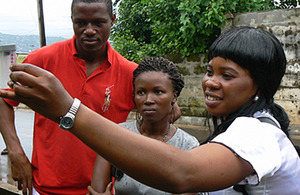Rapid response: Tackling cholera in Sierra Leone with Oxfam
How the UK's Rapid Response Facility is getting aid quickly to those in need

Patrick and Aminata, bucket chlorinators in Freetown, Sierra Leone, check water quality with an Oxfam public health expert. Pictures: Oxfam/Claire Seaward
Patrick, aged 25, is one of the many ordinary people leading the efforts to tackle the cholera outbreak in Sierra Leone.
His job title - bucket chlorinator - may not sound glamorous, but it’s vitally important. He’s working with Oxfam in Sierra Leone’s capital Freetown, to help chlorinate water, making it safe for people to drink.
Sierra Leone is currently suffering a cholera epidemic on an unprecedented scale. Estimates so far are that around 250 people have died, more than 15,000 cases have been reported and millions more are at risk. The outbreak has been most severe in the capital, Freetown, which has a dangerous mix of poor sanitation, high population density and limited health services.
The UK is leading international efforts to help tackle the crisis, activating its Rapid Response Facility last week. This has enabled Oxfam and other humanitarian agencies to quickly get lifesaving aid to many more people.
Patrick, and his colleague Aminata, are just 2 of 70 people that Oxfam had already trained as bucket chlorinators earlier this month. Both Patrick and Aminata put their names forward when Oxfam asked their community to nominate people to undertake this vital work. With the UK’s extra help, Oxfam will be now able to train another 100 people.
Each bucket chlorinator is given the responsibility of chlorinating all drinking water collected from a specific tapstand. Aminata and Patrick have been assigned a tapstand each in Kingtom, one of Freetown’s suburbs. They work from 7am to 2pm, as by this time people have collected their drinking water for the day.
Bucket chlorinators are trained and shown how to test the water for residual chlorine and how to administer the correct amounts of chlorine to the drinking water. They also learn how to teach people about cholera - especially how to prevent themselves and their families from contracting the disease and what to do if they become sick. Patrick and Aminata will be bucket chlorinators for one month.
Patrick said, “Every day we test the chlorine levels in the water, so we know how much chlorine needs to go into the buckets. It should be 0.5mg per litre.”
“This work is very important. We not only put chlorine in the drinking water, but we often also need to sensitise people on what cholera is.
“Many people don’t know about cholera. They think by straining water through a piece of material, they don’t catch the disease. We need to teach them how they can stop themselves and families from getting sick.”
Rapid response saves lives
The Rapid Response Facility (RRF) was established in March 2012. The RRF enables the UK Government to commit to rapid humanitarian funding for pre-qualified partners. Responding swiftly in humanitarian disasters ensures that more lives are saved and suffering reduced.
The RRF was activated for the first time on 24 August 2012, in response to the cholera outbreak in Sierra Leone. The UK has provided £2 million for the response. DFID is also sending a humanitarian expert to support coordination in Sierra Leone, to ensure a rapid response to cholera and value for money for UK taxpayers.
Six aid organisations are being mobilised as part of this RRF response: Oxfam, Save the Children, International Rescue Committee, Concern, Care International and the British Red Cross.